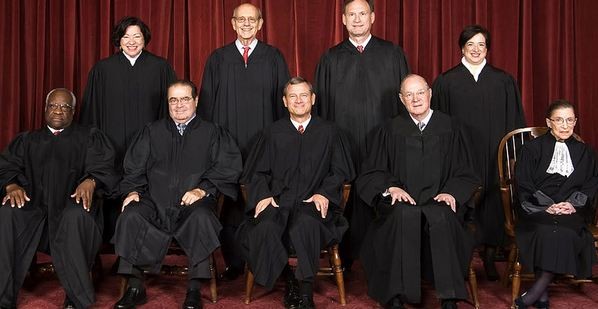U.S. Supreme Court Says Cops Need Warrants To Search Mobile Phones Of Suspects
| Arthur Dominic Villasanta | | Jun 27, 2014 04:08 PM EDT |
Justices of the US Supreme Court
The U.S. Supreme Court has finally declared illegal the abusive police practice of searching a suspect's mobile phone for information without the suspect's consent.
Voting 9-0, the justices unanimously ruled that police must get a search warrant before examining the contents of mobile phones they seize from people they arrest. The U.S. Supreme Court invoked the right of Americans to modest privacy protections in the troves of personal information stored in the compact devices.
Like Us on Facebook
"Modern cell phones are not just another technological convenience," wrote Chief Justice John Roberts in the unanimous decision.
"With all they contain and all they may reveal, they hold for many Americans the privacies of life."
Civil liberties advocates, often critical of the right-wing court that has defended gun rights and struck down election spending limits, celebrated the ruling.
"We have entered a new world but, as the court today recognized, our old values still apply and limit the government's ability to rummage through the intimate details of our private lives," said Steven Shapiro, legal director of the American Civil Liberties Union.
The ruling requires police officers to first persuade a judge the mobile phones they seize from suspects are likely to contain evidence of wrongdoing. The Supreme Court, however, said that while awaiting a warrant, police can confiscate a suspect's cell phone.
Police can also take steps to prevent accomplices from electronically erasing incriminating evidence. These steps include disconnecting or sealing the mobile phone.
The ruling effectively overturns a 2011 decision by the California Supreme Court that allowed police in the state to search cell phones without a warrant.
Legal sources said the unanimous ruling is a watershed moment for the digital rights movement, which champions applying the Fourth Amendment that protects against unreasonable search and seizure.
Chief Justice Roberts, who wrote the opinion, said searching a cell phone without a warrant constitutes a different, deeper privacy intrusion and that such warrantless searching protects neither officers nor evidence.
Comparing physical and digital searches, he said, "is like saying a ride on horseback is materially indistinguishable from a flight to the moon. Both are ways of getting from point A to point B, but little else justifies lumping them together."
The court said that since the digital devices have so much storage capacity, and because so much of the information stored would, in physical form, extend beyond a mere physical search, a warrant is required.
"Most people cannot lug around every piece of mail they have received for the past several months, every picture they have taken, or every book or article they have read-nor would they have any reason to attempt to do so. And if they did, they would have to drag behind them a trunk of the sort held to require a search warrant," Roberts wrote.
In addition, the search incident to arrest exception "may not be stretched to cover a search of files accessed remotely-that is, a search of files stored in the cloud."
"The fact that technology now allows an individual to carry such information in his hand does not make the information any less worthy of the protection for which the Founders fought," Roberts said.
"Our answer to the question of what police must do before searching a cell phone seized incident to an arrest is accordingly simple-get a warrant."
TagsSC ruling, U.S. Supreme Court, Search Warrants, Mobile Phones
©2015 Chinatopix All rights reserved. Do not reproduce without permission
EDITOR'S PICKS
-

Did the Trump administration just announce plans for a trade war with ‘hostile’ China and Russia?
-

US Senate passes Taiwan travel bill slammed by China
-

As Yan Sihong’s family grieves, here are other Chinese students who went missing abroad. Some have never been found
-

Beijing blasts Western critics who ‘smear China’ with the term sharp power
-

China Envoy Seeks to Defuse Tensions With U.S. as a Trade War Brews
-

Singapore's Deputy PM Provides Bitcoin Vote of Confidence Amid China's Blanket Bans
-

China warns investors over risks in overseas virtual currency trading
-

Chinese government most trustworthy: survey
-

Kashima Antlers On Course For Back-To-Back Titles
MOST POPULAR
LATEST NEWS
Zhou Yongkang: China's Former Security Chief Sentenced to Life in Prison

China's former Chief of the Ministry of Public Security, Zhou Yongkang, has been given a life sentence after he was found guilty of abusing his office, bribery and deliberately ... Full Article
TRENDING STORY

China Pork Prices Expected to Stabilize As The Supplies Recover

Elephone P9000 Smartphone is now on Sale on Amazon India

There's a Big Chance Cliffhangers Won't Still Be Resolved When Grey's Anatomy Season 13 Returns

Supreme Court Ruled on Samsung vs Apple Dispute for Patent Infringement

Microsoft Surface Pro 5 Rumors and Release Date: What is the Latest?










